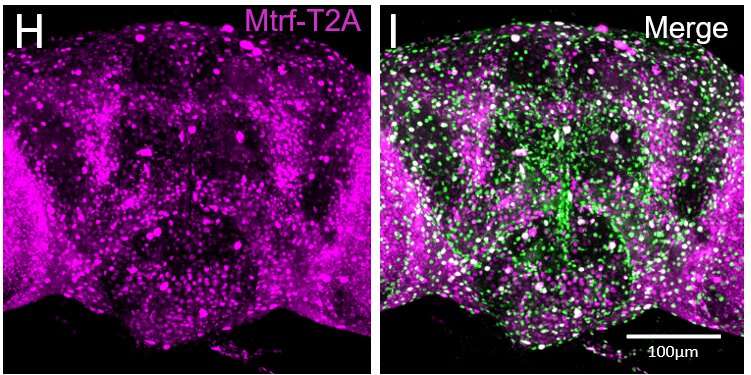This article has been reviewed according to Science X's editorial process and policies. Editors have highlighted the following attributes while ensuring the content's credibility:
fact-checked
peer-reviewed publication
trusted source
proofread
Variants of MRTFB gene linked to novel neurodevelopmental disorder

Researchers at Baylor College of Medicine have linked specific variants or mutations of the gene myocardin-related transcription factor B (MRTFB) with a novel neurodevelopmental disorder.
The team reports in the journal Genetics in Medicine that they were able to find variants in this gene in patients whose neurodevelopment disorders had previously gone undiagnosed. The research also revealed that the mutations disrupt the way the MRTFB protein controls other genes in the cell and this cascades to affect hundreds of other genes.
"We identified two patients with this novel neurodevelopmental disorder through the Undiagnosed Diseases Network (UDN). The patients have intellectual disability, difficulty speaking, impulse control issues, movement impairments and altered facial features," said first author Dr. Jonathan Andrews, postdoctoral associate of molecular and human genetics in Dr. Michael Wangler's lab.
"Both patients have mutations in the MRTFB gene, which until now had not been associated with a genetic condition. We decided to investigate how these mutations affected the function of the MRTFB protein to try to understand how the changes in the patient's gene might lead to their medical condition."
The MRTFB protein is an important transcriptional regulator, meaning it normally promotes the activity of approximately 300 other genes, including genes involved in making the structure of the cell and communication between brain cells. MRTFB is thought to be particularly important during early development in shaping the heart, lungs, liver and brain.
To understand the effect the mutations found in the patients had in the activity of the protein, Andrews and his colleagues took two different approaches. The researchers first investigated the effect the patients' MRTFB variants had in the laboratory fruit fly, a well-known animal model to study how genes work.
"Expressing the patients' MRTFB gene variants in the wings of fruit flies resulted in dramatic changes in wing shape, compared to expressing the normal MRTFB genes," Andrews said. "This finding suggested that the mutations somehow altered the activity of the protein in cells, which led to the altered wing development. We next took a closer look at the mutant MRTFB proteins at the molecular level."
Andrews and his colleagues knew that the protein actin binds to MRTFB and regulates its activity by limiting MRTFB's ability to enter the nucleus of the cell and promote the function of close to 300 other genes.
"We found that the mutant MRTFB proteins no longer bind to actin and therefore are free to enter the nucleus where they increase the expression of many other genes," Andrews said.
"While additional research is necessary to demonstrate that the patients' MRTFB variants affect neurological development, it is plausible that the lack of regulation present in these variants may be sufficient to alter normal patterns of neuronal growth and development," said Wangler, associate professor of molecular and human genetics and invare importestigator at the Jan and Dan Duncan Neurological Research Institute. He also is the corresponding author of the work. "The findings are important because they open new avenues to investigate mechanisms that lead to this disorder, offering ideas toward a future treatment for the disease."
More information: Jonathan C. Andrews et al, De Novo Variants in MRTFB have gain of function activity in Drosophila and are associated with a novel neurodevelopmental phenotype with dysmorphic features., Genetics in Medicine (2023). DOI: 10.1016/j.gim.2023.100833
















